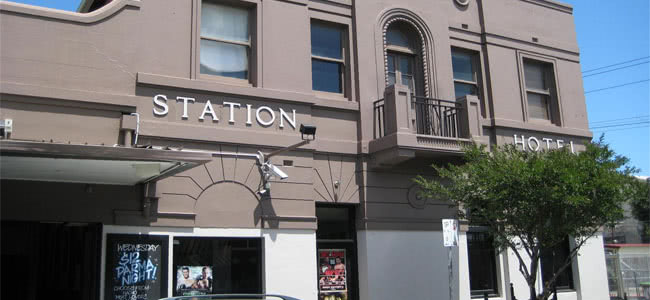It’s been a tumultuous year for live music venues across Australia, with just as many opening their doors as closing them, but one iconic pub in the southern heart of Melbourne is set to have its last drinks just as 2012 draws to a close, after a particularly long, and well-respected innings.
As the Stonnington Leader reports, The Station Hotel – located in Greville Street, Prahran – will be closing on December 23 after 108 years of service to make way for a new high-rise apartment complex.
Paul Shaw, the venue’s manger, said that while the plans of a closure had been in the works for nearly a year and a half, the final date arrived much quicker than he had anticipated. “It’s been a bit of a shock,” says Mr Shaw of the imminent razing of the live music hotspot, which in recent years has become a popular location for New Zealanders settling into Southern Melbourne.
“It’s their home away from home in a way,” the venue manager says, “we’ll miss being part of the Greville St community.” Meanwhile, Oskar Cebergs of the Chapel St Precinct Association says that there are enough licensed venues in the area; adding that: “As a principal activity centre we have to support the development of a sympathetic residential apartment (complex) in the Chapel St precinct.”
The Station Hotel, which was first established in 1904, was an important part of the local live music scene during the 1970s, where it played host to some of the biggest Australian bands of that decade, including AC/DC, The Dingoes, and Spectrum.
The venue was also the setting for the fabled, and extremely rare, 1976 vinyl LP, Live At The Station Hotel which featured performances from The Dingoes, The Wild Beaver Band, Myriad, and Saltbush.
Longtime Dingoes member John Bois recalls the iconic venue’s 70s heyday in his new book, The Dingoes’ Lament, which contains several extracts featuring The Station Hotel; one section reads:
Derelicts and dole dependents normally peopled the Station, as well as besotted bon vivants who claimed it was a haven of mateship, a place where men could be men out of earshot of nagging women. But to the untrained eye it looked more like a place of banishment. Nevertheless, on Saturday it was transformed into a subcultural temple. The gods of that subculture were … The Dingoes.”
Bois tells Tone Deaf he remembers the venue being “an old-fashioned pub,” recalling that fellow guitarist Chris Stockley “had the most intimate social network” at the live venue, adding that “beer was free for the bands. I remember the hours that we played were strange [by] today’s standard.”
“I think we played around 8pm on a week night, finish before 10pm,” says the bassist. “But the biggest draw was on Sunday afternoon… 2pm to something. You could live a regular work life and still go out to hear music.”
Another choice extract from Bois’ tome reads:
At two in the afternoon, three hundred people and five gods converged at the bar. At six, three hundred drunks and five drunk gods waded across the beer-soaked carpet and out into a world strangely untouched by the four hours of sweat, inebriation and rocking music. We were not stars. We satirised stardom. The Station audience loved us because we refused to take anything, including ourselves, seriously.
On stage we had no light show, no props, no choreographed moves, no staging of any kind. We didn’t vomit blood, or leer like trolls while rolling our tongues lasciviously at the audience. Our strengths were our personalities and our music. And at the Station, the room was intimate enough for both to count.
John Bois’ The Dingoes Lament is out now through Melbourne Books, details here.




































